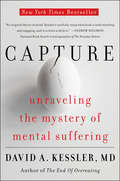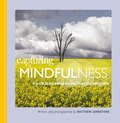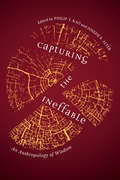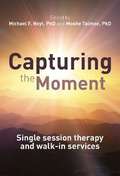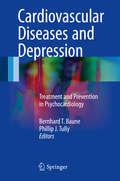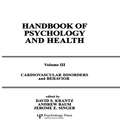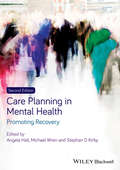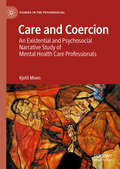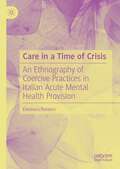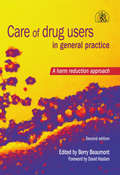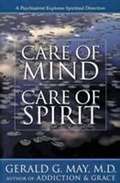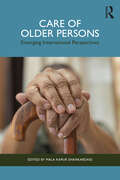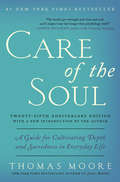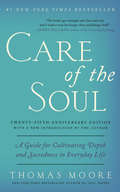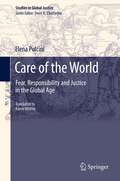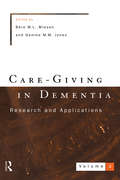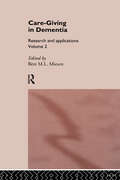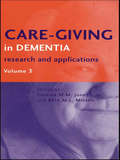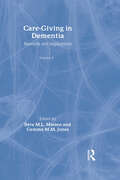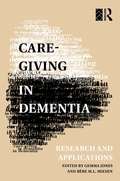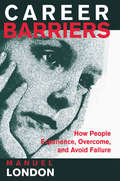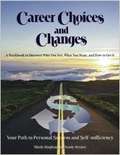- Table View
- List View
Capture: Unraveling the Mystery of Mental Suffering
by David A. KesslerWhy do we think, feel, and act in ways we wished we did not? For decades, New York Times bestselling author Dr. David A Kessler has studied this question with regard to tobacco, food, and drugs. Over the course of these investigations, he identified one underlying mechanism common to a broad range of human suffering. This phenomenon--capture--is the process by which our attention is hijacked and our brains commandeered by forces outside our control.In Capture, Dr. Kessler considers some of the most profound questions we face as human beings: What are the origins of mental afflictions, from everyday unhappiness to addiction and depression--and how are they connected? Where does healing and transcendence fit into this realm of emotional experience?Analyzing an array of insights from psychology, medicine, neuroscience, literature, philosophy, and theology, Dr. Kessler deconstructs centuries of thinking, examining the central role of capture in mental illness and questioning traditional labels that have obscured our understanding of it. With a new basis for understanding the phenomenon of capture, he explores the concept through the emotionally resonant stories of both well-known and un-known people caught in its throes.The closer we can come to fully comprehending the nature of capture, Dr. Kessler argues, the better the chance to alleviate its deleterious effects and successfully change our thoughts and behavior Ultimately, Capture offers insight into how we form thoughts and emotions, manage trauma, and heal. For the first time, we can begin to understand the underpinnings of not only mental illness, but also our everyday worries and anxieties. Capture is an intimate and critical exploration of the most enduring human mystery of all: the mind.
Capturing Mindfulness
by Matthew JohnstoneThere are few better ways to consciously slow down and truly engage with your surroundings than when you are armed with a camera. With Capturing Mindfulness, de-stressing and being in the moment needn't be limited to simple diary-keeping and fill-in journals; instead you can capture it with your lens. Bestselling author Matthew Johnstone's latest book Capturing Mindfulness, is a natural follow on from his last book Quiet the Mind which came out in 2012.Matthew has been practicing what he terms 'photopresent' for the last 15 years and believes that next to meditation, this is one of the most creative and enjoyable ways to attain mindfulness in day-to-day life. The very essence of photography; after all, is all about focus and capturing 'the moment'.Matthew is fascinated by light, colour, composition and most importantly how he can see the world differently. For him, having camera in your hands is the reminder to consciously slow everything down from your breath, to your walk, to your thoughts and begin to really observe your surroundings as if seeing them for the first time.Mindfulness photography is about seeing something that no one else can, capturing something that will never happen again and finding beauty where it doesn't typically exist. When we become more consciously aware of where we are, what we're doing and what we're thinking, life can become calmer, more enjoyable and generally more manageable.
Capturing the Ineffable: An Anthropology of Wisdom
Grounded in ethnographic case studies that examine experiences from which wisdom emerges, Capturing the Ineffable provides a rigorous analysis of the sociocultural context of wisdom in the contemporary world. Each chapter in the volume deals with different aspects and showcases how communities in different contexts — nursing homes, religious organizations, corporations, and monastic institutions, for example — engage with the ineffability of wisdom. Contributors draw from a range of disciplines and cross-cultural and historical data in order to interpret the meaning and value of wisdom as a human endeavour. This book also represents an anthropological method for evaluating various philosophical and scientific approaches to understanding wisdom, including how wisdom is learned and taught. Readers will be able to appreciate how action, emotion, uncertainty, and cultural systems come to bear on wisdom as a value in human life and expression. In the end, Capturing the Ineffable reveals how the conception and paradoxical nature of wisdom dispels the dichotomies of self/other, structure/agency, known/unknown, nature/culture, and the like. What is at stake is a recasting of wisdom as a particular kind of anthropological endeavour and, thus, a return to and modification of philosophical anthropology.
Capturing the Moment: Single Session Therapy and Walk-In Services
by Michael F. Hoyt Moshe TalmonThe book describes the history, theory, utility and practice (clinical and administrative) of single session and walk-in therapy. In keeping with the international scope of SST and walk-in services, the volume contains reports from the United States, Canada, Israel, Australia, England, Mexico and China.
Cardiovascular Diseases and Depression: Treatment and Prevention in Psychocardiology
by Bernhard T. Baune Phillip J. TullyThe world is witnessing a burgeoning global epidemic of chronic cerebro-and cardiovascular disease and depression disorders. The reader will find thiscomprehensive book to be a long-needed, up-to-date knowledge base on theseincreasingly recognized comorbid conditions that have long-term consequencesfor individual function and well-being and society in general. Thiscomprehensive book outlines the complex and bidirectional relationship betweenvarious types of depression and cerebro- and cardiovascular diseases. It iswritten by a range of experts in the field, including psychiatrists,cardiologists, neuroscientists, psychologists, and epidemiologists, with theaim of presenting and discussing the most recent evidence on thepathophysiology, neurobiology, and clinical presentation of these common anddisabling comorbid conditions and the available pharmacological, psychological,and behavioral interventions. By elucidating the underlying clinical andneurobiological mechanisms in the brain and the rich interplay between the bodyand the brain biology, the book brings together the latest knowledge of thisoverlapping area in Psychiatry and Cardiology. The clear descriptions ofevidence-based approaches to clinical treatment ensure that it will serve as bothan up-to-date overview and a future guide for practicing clinicians andgraduate students.
Cardiovascular Disorders and Behavior: Handbook of Psychology and Health, Volume 3 (Handbook of Psychology and Health Series)
by Andrew Baum David S. Krantz Jerome E. SingerFirst published in 1983. This is Volume III of the Handbook of Psychology and Health. Cardiovascular diseases are arguably the largest cause of death in the United States. This statement attests to the importance of understanding these disorders, in order to be able to prevent, ameliorate, and reduce the devastation which this set of diseases can cause. Cardiovascular disorders have also been the most intensely studied of those health hazards that have come to the attention of behavioral scientists. The many ways in which these problems are influenced by environmental, social, and behavioral factors have provided a fertile ground for study by investigators of many disciplines and persuasions. For these two reasons, it is appropriate that a volume in this series be directed toward the study of cardiovascular disease.
Care Planning in Mental Health
by Mike Wren Angela Hall Stephan KirbyCare planning and delivery are essential parts of everyday practice for all mental health practitioners. This new edition of Care Planning in Mental Health: Promoting Recovery moves away from a professionally-oriented model of care planning towards the active promotion of the personal narrative as being central to planning effective mental health care. It outlines essential concepts linked to the recovery process which is carried out in partnership with people with mental health problems and those closest to them.New to this edition:A stronger, more explicit focus on recoveryA unique interpretation and explication of the recovery processA greater promotion of the centrality of personhoodExamples drawing on a range of international perspectives and experiencesEnhanced user-friendly pedagogy, including practical case illustrations and first-hand accounts throughoutCare Planning in Mental Health: Promoting Recovery is an ideal resource for anyone involved in the field of mental health care. It is also a valuable learning resource for students studying mental health care and the qualified and experienced practitioner wishing to gain a fresh approach to planning recovery-focused care.
Care and Coercion: An Existential and Psychosocial Narrative Study of Mental Health Care Professionals (Studies in the Psychosocial)
by Kjetil MoenThis book presents an existential and psychosocial interpretation of the experiences of mental health care practitioners whose work involves use of coercion. Through in-depth case studies carried out in Norway, and theoretical discussions, it examines how the use of coercion is not merely directed by laws and regulations, but also by the situated subjectivities of the practitioners, and the wider contexts informing them. It demonstrates how the inner and outer worlds, the psychic and the social, and the existential and the cultural, all impact the professionals' experience and capacity to care. Employing a phenomenological and contextual approach, the book explores the practitioners’ paradoxical experiences of mandating and physically undertaking coercive measures toward vulnerable patients, while at the same time being members of a democratic society in which autonomy is a defining feature. It demonstrates the impact on professionals who are both authorized to use coercion and critiqued by the authorities for doing so. The author discusses what informs the moral deliberations taking place within and between professional subjects in charged situations involving use of coercion, and how the experience of using coercion informs the self-understanding of the professional and thus potentially future decision-making processes pertaining to the use of coercive measures. In doing so the book provides a look behind closed doors of “total institutions” that addresses, and partly undresses, psychiatric power. This book offers a rich, contextual examination of mental health care practice that will be of interest to students, practitioners, and researchers of psychiatry, as well as those of adjacent fields such as psychology, social work, nursing, and criminology.
Care in Mental Health-Substance Use
by David B. CooperThe Mental Health-Substance Use series provides clear guidance for professionals on this complex and increasingly recognised field. It concentrates on the concerns, dilemmas and concepts that impact on the life and well-being of affected individuals and those close to them, as well as the future direction of practice, education, research, services, intervention, and treatment. This volume is primarily about caring for individuals and families who turn to professionals at a time when their lives are unmanageable alone, but is also concerned with the care that these professions extend to their own members. It contends that these issues are closely interrelated, with appropriate communication and support being key to both. Its chapters draw from a variety of theories and treatments to provide practical advice on the challenge of providing appropriate care tailored to a wide scope of individuals and families. The volumes in this series are designed to challenge concepts and stimulate debate, exploring all aspects of the development in treatment, intervention and care response, and the adoption of research-led best practice. They are essential reading for mental health and substance use professionals, students and educators.
Care in a Time of Crisis: An Ethnography of Coercive Practices in Italian Acute Mental Health Provision
by Eleonora RosseroThe book presents the results of an ethnographic study examining the post-deinstitutionalized organization and provision of acute mental health care in Italy. While the achievements of the “Basaglia law” which imposed the closure of psychiatric hospitals in Italy in 1978 have been well-documented, this book sheds fresh light on its aftermath and possible continuing influence. The author examines two Italian regions – Piedmont and Friuli Venezia Giulia (internationally known to be the first Italian region to close down asylums) – respectively as representatives of the ‘restraint’ and ‘no-restraint’ models. Within each context, participant observation and discursive interviews have been conducted in Mental Health Centres (CSM) and acute psychiatric wards (SPDC) to explore care and coercive practices, as well as notions of ‘good care’ and values embedded in everyday working activities of these services. Situated suggestions for possible improvement of today’s acute mental health care are also proposed.This book offers a novel ethnography of mental health care in the Italian context that will appeal in particular to practitioners and scholars in the fields of critical mental health, cross-cultural psychology, the history of psychiatry and the sociology of health.
Care of Drug Users in General Practice: A Harm Reduction Approach, Second Edition
by Berry Beaumont; David HaslamThe National Primary Care Research and Development Centre series provides policy makers, commissioners, managers, primary care professionals and user organizations with up-to-date multi-disciplinary research on important issues that inform future decision making for primary care development. This book examines the key factors shaping the relationship between demand for, and use of, primary care. It provides a detailed picture with which to inform the planning of appropriate, acceptable and responsive primary care services. Patients' perceptions are important, not only because they are a barometer of the appropriateness and effectiveness of services, but because they are a unique source of knowledge about the way in which people use services when they do, for the reasons that they do. This book concisely presents empirical findings and summarizes key policy and conceptual issues.
Care of Mind, Care of Spirit
by Gerald G. MayAlthough secular psychology addressed a great deal about how we come to be the way we are and how we might live more efficiently, it can offer nothing in terms of why we exist or how we should use our lives," writes Gerald May in this classic discussion of the nature of contemporary spiritual guidance and its relationship to counseling and psychiatry. For millions turning for answers to the world of the spirit, May shows how psychiatry and spiritual direction are alike, how they complement one another, and how they ultimately diverge.
Care of Older Persons: Emerging International Perspectives
by Edited by Mala Kapur ShankardassThis book explores the implications and significant ethical, social, economic and health challenges that an ageing world population presents. It provides valuable insights on concerns related to providing, organizing, planning and managing care for older persons in both formal and informal settings.As the number of older persons increases rapidly around the globe, caring for them is a very important aspect of all ageing and aged societies. While in most countries the care of older persons is provided informally by family members, the changing social scene, family structures and work and employment patterns are leading many nations to create provisions for formal care through institutions or paid services of caregivers. This book offers perspectives on formal and informal care from countries such as Japan, the Netherlands, the USA, India, South Africa and Poland, among others. The essays in this book underline a rights-based approach and focus on ethical, social, economic, health and legal aspects of care as they pertain to the universal phenomena of ageing as well as the specific demographic and epidemiological realities of the selected countries. They discuss concerns such as long-term care provisions, catering to the needs of people affected by dementia, providing residential care, taking the needs of family care providers into account, the growing requirement for paid care workers and channelizing training of both skilled and semi-skilled care providers to suit the needs of older people.This volume would be of interest to scholars and those working in the fields of sociology, health studies, age and ageing, psychology, social work, medical sciences, nursing and public policy. It will also be useful to NGO sector workers, administrators, as well as grassroots workers involved with the care of older persons.
Care of the Soul Twenty-fifth Anniversary Edition
by Thomas MooreIn this special twenty-fifth anniversary edition of Thomas Moore's bestselling Care of the Soul, which includes a new introduction by the author, readers are presented with a revolutionary approach to thinking about daily life--everyday activities, events, problems, and creative opportunities--and a therapeutic lifestyle is proposed that focuses on looking more deeply into emotional problems and learning how to sense sacredness in ordinary things.Basing his writing on the ancient model of "care of the soul"--which provided a religious context for viewing the everyday events of life--Moore brings "care of the soul" into the twenty-first century. Promising to deepen and broaden the readers' perspectives on their life experiences, Moore draws on his own life as a therapist practicing "care of the soul," as well as his studies of the world's religions and his work in music and art, to create this inspirational guide that examines the connections between spirituality and the problems of individuals and society."Thoughtful, eloquent, inspiring." --San Francisco Chronicle"I soulfully recommend it without reservation." --John Bradshaw, author of Homecoming
Care of the Soul: A Guide for Cultivating Depth and Sacredness in Everyday Life
by Thomas MooreThis New York Times bestseller (more than 200,000 hardcover copies sold) provides a path-breaking lifestyle handbook that shows how to add spirituality, depth, and meaning to modern-day life by nurturing the soul.
Care of the World: Fear, Responsibility and Justice in the Global Age (Studies in Global Justice #11)
by Elena Pulcini Karen WhittleThis book proposes a philosophy of care in a global age. It discusses the distinguishing and opposing pathologies produced by globalization: unlimited individualism or self-obsession, manifested as (Promethean) omnipotence and (narcissistic) indifference, and endogamous communitarianism or an 'us'-obsession that results in conflict and violence. The polarization between a lack and an excess of pathos is reflected in the distorted forms taken on by fear. The book advocates a metamorphosis of fear, which may restore in the subject an awareness of vulnerability and become the precondition for moral action. Such awareness and the recognition of the condition of contamination caused by the other's unavoidable presence teach us to fear for rather than be afraid of. Fear for the world means care of the world, and care, understood as concern and solicitude, is a new notion of responsibility, in which the stress is shifted to a relational subject capable of responding to and taking care of the other. From a global perspective, the proposed vision of care also compels us to explore a new paradigm of justice.
Care, Uncertainty And Intergenerational Ethics
by Christopher GrovesOur capacity to reshape the future has never been more powerful. Yet our ability to foresee the consequences of what we do has not kept pace. Is the idea that we have responsibilities to future generations therefore meaningful? This book argues that it is, with the aid of a unique reading of the care ethics tradition.
Care-Giving In Dementia 2: Research And Applications
by Gemma M. M. Jones Bère M. L. MiesenCare-giving in dementia is a new speciality with its own rapidly growing body of knowledge. This second volume of contributions from leading practitioners and researchers around the world is a handbook for all those involved in hands on caring, or in planning care, for persons with dementia. Volume 2 of Care-Giving in Dementia provides a rich source of information on most recent thinking about individualised long-term care of both dementia sufferers and their families. Key themes in Volume 2 are: the subjective experience of dementia the provision of care for family carers differing cultural perspectives of dementia the crucial importance of life-history information for understanding a person's reaction to their illness. Chapters on the search for an ethical framework and the best environment within which to provide care are particularly timely.
Care-Giving In Dementia: Volume 2
by Bère M. L. Miesen and Gemma M. M. JonesCare-giving in dementia is a new speciality with its own rapidly growing body of knowledge. This second volume of contributions from leading practitioners and researchers around the world is a handbook for all those involved in 'hands on' caring, or in planning care, for persons with dementia. Volume 2 of Care-Giving in Dementia provides a rich source of information on most recent thinking about individualized long-term care of both dementia sufferers and their families. Key themes in Volume 2 are: * the subjective experience of dementia * the provision of care for family carers * differing cultural perspectives of dementia * the crucial importance of life-history information for understanding a person's reaction to their illness. Chapters on the search for an ethical framework and the best environment within which to provide care are particularly timely.
Care-Giving in Dementia V3: Research and Applications Volume 3
by Gemma M. M. Jones Bère M. L. MiesenThe first two volumes of Care-Giving in Dementia integrated up-to-date neurobiological information about dementia with specific developments in care-giving. Taking the same multidisciplinary approach, and drawing contributions from leading practitioners, this third volume will prove invaluable to health and mental health professionals caring for people with dementia. Key themes in Volume 3 include: personal construct psychology and person-centred care; living in lifestyle groups in nursing homes; music therapy for people with dementia; support programmes for caregivers of people with dementia; coping in early dementia; stress and burden on care-givers; the Alzheimer Café concept and new support groups for people with dementia; ethical issues in the care of elderly people with dementia in nursing homes.
Care-Giving in Dementia: Research and Applications Volume 4
by Bere M.L. Miesen Gemma M.M. JonesVolume 4 of Care-Giving in Dementia builds on previous volumes to continue to make a significant contribution to establishing a knowledge base for the developing field of care-giving in dementia. The editors bring together contributions from leading practitioners and researchers to bring the reader up to date with new developments in diagnosis, treatment and care. Subjects covered include: visuo-perceptual changes in Alzheimer’s disease, the Alzheimer Café concept, attachment in dementia, the role of humour in dementia, the awareness context of persons with dementia, couples group (psycho) therapy in dementia, spirituality, and improving end-of-life care for people with dementia. Care Giving in Dementia makes state of the art research accessible and relevant for professional care-givers. It will help all health and mental health professionals caring for people with dementia to enhance their practice, educate others and investigate possibilities for further developments in this fast-growing field.
Care-Giving in Dementia: Volume 1: Research and Applications
by Gemma M.M. Jones BA practical book for practical people,Care-Giving in Dementia integrates neurobiological information about dementia with specific developments in care-giving. Multi-disciplinary and multi-professional in its approach, it emphasizes the variety of techniques that can be used effectively in caring for persons with dementia.
Career Advice for Young Scientists in Biomedical Research: How to Think Like a Principal Investigator
by Béla Z. SchmidtPursuing a career in biomedical research can be daunting, considering the stiffer competition and uncertain career prospects in academia. This book summarizes career advice gathered during in-depth interviews with 106 biomedical scientists who lead their own laboratories. The participating principal investigators are from 44 research institutions in 11 countries. This book is unique in that it provides a glimpse into the mindset of principal investigators. Here, the reader will learn about common thought patterns and values, as well as the range of opinions and ways of thinking to be found among a large group of active principal investigators – without having to read more than a hundred individual autobiographies.The book will benefit all PhD students who want to learn more about their supervisor’s mindset in order to successfully complete their projects. It can help freshly graduated PhDs planning to pursue an academic career, and MDs contemplating a career in research, to decide whether they truly want to embark on this path. Lastly, it can offer young principal investigators a source of inspiration on how to succeed and achieve their goals.
Career Barriers: How People Experience, Overcome, and Avoid Failure
by Manuel LondonThis volume's goal is to help readers understand how people react to career barriers and how people develop constructive ways of coping with them. Drawing on original cases and data from interviews with people who faced different types of career barriers, the author describes how people react to, and make sense of, unfortunate events in their lives--and career barriers when they occur. He considers how and why some people cope constructively while others don't, and explores how resilience and support from others help get us through tough times and emerge with a sense of renewal and career growth. He suggests how we can manage career barriers and prepare for--or even prevent--career barriers through foresight, planning, and education. These methods also suggest what managers and organizations should do to help their employees who are or may soon be facing career barriers. People can learn while facing the stress and self-questioning that accompany career barriers, but this is not an easy process. Learning requires considerable self-understanding and environmental support. The organization can play a vital role in limiting people's pain and creating opportunities. However, despite generous severance packages and outplacement services, many organizations have been little help to people who lose their jobs, suffer job stress, face unreasonably demanding bosses, or suffer from physical handicaps or chronic illnesses. Most of the burden falls on individuals and their families. Assistance can and should come from employers, government agencies, educational institutions, and religious organizations. While the book focuses on the perspectives of people who have been or may be affected by career barriers, the material should be of interest to a broad range of readers --in particular, academics who study careers, practitioners in the fields of training and development, and government officials who set public policy that affects displaced workers.
Career Choices and Changes
by Mindy Bingham Sandy Stryker<p>From best-selling authors with over 2 million books in print, this new edition of Career Choices and Changes updates and enhances the earlier expert-applauded versions to address the realities of the 21st-century workplace. Career Choices and Changes is unique because: <p> <li>It provides a step-by-step workbook/journal format to help the reader discover for themselves the careers that will match their passions, lifestyle aspirations, skills, and aptitudes. <li>It promotes learning through questioning rather than through the didactic copy of traditional books, empowering the reader to consider and contemplate their own unique qualities and desires. <li>It introduces a process for career and lifestyle decision-making that can be used over and over again, thereby empowering the reader to productively navigate through a lifetime of workplace and personal change. <li>Combined with the optional My10yearPlan.com the learner comes away with a comprehensive planned portfolio to help chart their course for the life-long learning that change necessitates.</li>
